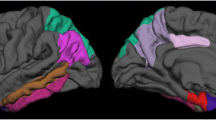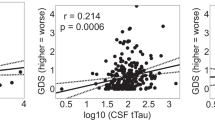Abstract
We examined whether cognitive reserve moderated the relationship between neurodegeneration and cognition in 67 postmortem persons with HIV (PWH) who were cognitively assessed within 1 year of death. Cognitive reserve was measured via the Wide Range Achievement Test-4 reading subtest (WRAT4). Synaptodendritic neurodegeneration was based on densities of synaptophysin and microtubule-associated protein 2 immunohistochemical reactivity in frontal cortex, and categorized as minimal, moderate, or severe (tertile-split). T-Scores from 15 cognitive tests were averaged into a global cognitive T-score. Among those with low cognitive reserve (based on WRAT4 median split), the moderate neurodegeneration group showed cognition that was poorer than the minimal neurodegeneration group and comparable to the severe neurodegeneration group. Among those with high cognitive reserve, the moderate neurodegeneration group showed cognition comparable to the minimal neurodegeneration group and better than the severe neurodegeneration group. High cognitive reserve may buffer against cognitive impairment among PWH with moderate, but not severe, neurodegeneration.


Similar content being viewed by others
Data availability
Biospecimens and clinical data collected as part of the NNTC protocols are available from the NNTC by request. Selected clinical data variables are available through the NNTC Query Tools to help requestors shape data and tissue requests and identify subpopulations of interest. Additional clinical data, beyond what is available from the Query Tools, is available from the NNTC cohorts and can be requested from the NNTC using the Data Request Application. Specimens or data obtained from the NNTC cannot be distributed to third-party companies or institutions without prior consent from the NNTC Steering Committee.
References
Antinori A, Arendt G, Becker JT, Brew BJ, Byrd DA, Cherner M, Clifford DB, Cinque P, Epstein LG, Goodkin K, Gisslen M, Grant I, Heaton RK, Joseph J, Marder K, Marra CM, McArthur JC, Nunn M, Price RW, Pulliam L, Robertson KR, Sacktor N, Valcour V, Wojna VE (2007) Updated research nosology for HIV-associated neurocognitive disorders. J Neurol 69(18):1789–1799
Benedict RH, Morrow SA, Weinstock Guttman B, Cookfair D, Schretlen DJ (2010) Cognitive reserve moderates decline in information processing speed in multiple sclerosis patients. J Int Neuropsychol Soc 16(5):829–835
Brown LA, ** J, Ferrell D, Sadic E, Obregon D, Smith AJ, Tan J, Giunta B (2014) Efavirenz promotes β-secretase expression and increased Aβ1-40,42 via oxidative stress and reduced microglial phagocytosis: implications for HIV associated neurocognitive disorders (HAND). PLoS ONE 9(4):e95500
Casaletto KB, Weber E, Iudicello JE, Woods SP (2017) Real-world impact of HIV-associated neurocognitive impairment. Changes in the brain: impact on daily life. J Neurovirol: 211–45
Chapko D, McCormack R, Black C, Staff R, Murray A (2018) Life-course determinants of cognitive reserve (CR) in cognitive aging and dementia - a systematic literature review. Aging Ment Health 22(8):915–926
Cysique LA, Franklin D, Jr., Abramson I, Ellis RJ, Letendre S, Collier A, Clifford D, Gelman B, McArthur J, Morgello S, Simpson D, McCutchan JA, Grant I, Heaton RK, Group C, Group H (2011) Normative data and validation of a regression based summary score for assessing meaningful neuropsychological change. J Clin Exp Neuropsychol 33(5):505–522
Ellis RJ, Calero P, Stockin MD (2009) HIV infection and the central nervous system: a primer. Neuropsychol Rev 19(2):144–151
Foley JM, Ettenhofer ML, Kim MS, Behdin N, Castellon SA, Hinkin CH (2012) Cognitive reserve as a protective factor in older HIV-positive patients at risk for cognitive decline. Appl Neuropsychol Adult 19(1):16–25
Hall CB, Derby C, LeValley A, Katz MJ, Verghese J, Lipton RB (2007) Education delays accelerated decline on a memory test in persons who develop dementia. J Neurol 69(17):1657–1664
Heaton RK, Franklin DR, Ellis RJ, McCutchan JA, Letendre SL, Leblanc S, Corkran SH, Duarte NA, Clifford DB, Woods SP, Collier AC, Marra CM, Morgello S, Mindt MR, Taylor MJ, Marcotte TD, Atkinson JH, Wolfson T, Gelman BB, McArthur JC, Simpson DM, Abramson I, Gamst A, Fennema-Notestine C, Jernigan TL, Wong J, Grant I (2011) HIV-associated neurocognitive disorders before and during the era of combination antiretroviral therapy: differences in rates, nature, and predictors. J Neurovirol 17(1):3–16
Heaton RK, Miller SW, Taylor MJ, Grant I (2004) Revised comprehensive norms for an expanded Halstead-Reitan Battery: demographically adjusted neuropsychological norms for African American and Caucasian adults. Psychological Assessment Resources Lutz, FL
Hindle J, Martyr A, Clare L (2014) Cognitive reserve in Parkinson’s disease: a systematic review and meta-analysis. Parkinsonism Relat Disord 20:1–7
Kamal S, Locatelli I, Wandeler G, Sehhat A, Bugnon O, Metral M, Du Pasquier R, Gutbrod K, Cavassini M, Schneider MP (2017) The presence of human immunodeficiency virus-associated neurocognitive disorders is associated with a lower adherence to combined antiretroviral treatment. Open Forum Infect Dis 4(2):ofx070
Kaur N, Dendukuri N, Fellows LK, Brouillette MJ, Mayo N (2020) Association between cognitive reserve and cognitive performance in people with HIV: a systematic review and meta-analysis. AIDS Care 32(1):1–11
Kesler SR, Adams HF, Blasey CM, Bigler ED (2003) Premorbid intellectual functioning, education, and brain size in traumatic brain injury: an investigation of the cognitive reserve hypothesis. Appl Neuropsychol 10(3):153–162
Levine AJ, Soontornniyomkij V, Achim CL, Masliah E, Gelman BB, Sinsheimer JS, Singer EJ, Moore DJ (2016) Multilevel analysis of neuropathogenesis of neurocognitive impairment in HIV. J Neurovirol 22(4):431–441
Manly JJ, Touradji P, Tang MX, Stern Y (2003) Literacy and memory decline among ethnically diverse elders. J Clin Exp Neuropsychol 25(5):680–690
Martin-Thormeyer EM, Paul RH (2009) Drug abuse and hepatitis C infection as comorbid features of HIV associated neurocognitive disorder: neurocognitive and neuroimaging features. Neuropsychol Rev 19(2):215–231
Masliah E, Heaton RK, Marcotte TD, Ellis RJ, Wiley CA, Mallory M, Achim CL, McCutchan JA, Nelson JA, Atkinson JH, Grant I (1997) Dendritic injury is a pathological substrate for human immunodeficiency virus-related cognitive disorders. HNRC Group. The HIV Neurobehavioral Research Center. Ann Neurol 42(6):963–72
Milanini B, Ciccarelli N, Fabbiani M, Limiti S, Grima P, Rossetti B, Visconti E, Tamburrini E, Cauda R, Di Giambenedetto S (2016) Cognitive reserve and neuropsychological functioning in older HIV-infected people. J Neurovirol 22(5):575–583
Moore DJ, Masliah E, Rippeth JD, Gonzalez R, Carey CL, Cherner M, Ellis RJ, Achim CL, Marcotte TD, Heaton RK, Grant I (2006) Cortical and subcortical neurodegeneration is associated with HIV neurocognitive impairment. AIDS 20(6):879–887
Morgan EE, Woods SP, Smith C, Weber E, Scott JC, Grant I (2012) Lower cognitive reserve among individuals with syndromic HIV-associated neurocognitive disorders (HAND). AIDS Behav 16(8):2279–2285
Narsi K, Tomita A, Ramlall S (2020) Cognitive reserve and its determinants in newly HIV diagnosed antiretroviral-naive adults from periurban and informal settlements: evidence from an HIV hyperendemic South African setting. J Acquir Immune Defic Syndr 85(3):387–393
Norman MA, Moore DJ, Taylor M, Franklin D, Jr., Cysique L, Ake C, Lazarretto D, Vaida F, Heaton RK, Group H (2011) Demographically corrected norms for African Americans and Caucasians on the Hopkins Verbal Learning Test-Revised, Brief Visuospatial Memory Test-Revised, Stroop Color and Word Test, and Wisconsin Card Sorting Test 64-Card Version. J Clin Exp Neuropsycho 33(7):793–804
Patel SM, Thames AD, Arbid N, Panos SE, Castellon S, Hinkin CH (2013) The aggregate effects of multiple comorbid risk factors on cognition among HIV-infected individuals. J Clin Exp Neuropsychol 35(4):421–434
Pope CN, Fazeli PL, Vance DE, Mrug S, Ball KK, Stavrinos D (2022) Cognitive reserve attenuates the association between HIV serostatus and cognitive performance in adults living in the deep South. Appl Neuropsychol Adult 29(5):993–1002
Rohit M, Levine A, Hinkin C, Abramyan S, Saxton E, Valdes-Sueiras M, Singer E (2007) Education correction using years in school or reading grade-level equivalent? Comparing the accuracy of two methods in diagnosing HIV-associated neurocognitive impairment. J Int Neuropsychol Soc 13(3):462–470
Saloner R, Lobo JD, Paolillo EW, Campbell LM, Letendre SL, Cherner M, Grant I, Heaton RK, Ellis RJ, Moore DJ (2022) Cognitive and physiologic reserve independently relate to superior neurocognitive abilities in adults aging with HIV. J Acquir Immune Defic Syndr 90(4):440–448
Scarmeas N, Zarahn E, Anderson KE, Habeck CG, Hilton J, Flynn J, Marder KS, Bell KL, Sackeim HA, Van Heertum RL, Moeller JR, Stern Y (2003) Association of life activities with cerebral blood flow in Alzheimer disease: implications for the cognitive reserve hypothesis. Arch Neurol 60(3):359–365
Stern Y (2012) Cognitive reserve in ageing and Alzheimer’s disease. Lancet Neurol 11(11):1006–1012
Stern Y (2013) Cognitive reserve: implications for assessment and intervention. Folia Phoniatr Logop 65(2):49–54
Stern Y, Gurland B, Tatemichi TK, Tang MX, Wilder D, Mayeux R (1994) Influence of education and occupation on the incidence of Alzheimer’s disease. JAMA 271(13):1004–1010
Stern RA, Silva SG, Chaisson N, Evans DL (1996) Influence of cognitive reserve on neuropsychological functioning in asymptomatic human immunodeficiency virus-1 infection. Arch Neurol 53(2):148–153
Sumowski JF, Leavitt VM (2013) Cognitive reserve in multiple sclerosis. Mult Scler 19(9):1122–1127
Sundermann EE, Heaton RK, Pasipanodya E, Moore RC, Paolillo EW, Rubin LH, Ellis R, Moore DJ (2018) Sex differences in HIV-associated cognitive impairment. AIDS 32(18):2719–2726
Thames AD, Foley JM, Panos SE, Singer EJ, Hinkin CH (2011) Cognitive reserve masks the neurobehavioral expression of HIV neurological disorder in older adults. Neurobehav HIV Med 3:87–93
Thames AD, Arentoft A, Rivera-Mindt M, Hinkin CH (2013) Functional disability in medication management and driving among individuals with HIV: a 1-year follow-up study. J Clin Exp Neuropsychol 35(1):49–58
Tucker AM, Stern Y (2011) Cognitive reserve in aging. Curr Alzheimer Res 8(4):354–360
Vivithanaporn P, Heo G, Gamble J, Krentz HB, Hoke A, Gill MJ, Power C (2010) Neurologic disease burden in treated HIV/AIDS predicts survival: a population-based study. J Neurol 75(13):1150–1158
Wilkinson GS, Robertson GJ (2006) Wide Range Achievement Test—Fourth Edition. Psychological Assessment Resources, Lutz, FL
World Health Organization (1998) Composite International Diagnostic Interview (CIDI, version 2.1). Geneva, Switzerland: World Health Organization
Zhu W, Li X, Li X, Wang H, Li M, Gao Z, Wu X, Tian Y, Zhou S, Wang K, Yu Y (2021) The protective impact of education on brain structure and function in Alzheimer’s disease. BMC Neurol 21(1):423
Funding
Primary funding supporting this study was from R01 MH096648 (MPIs: Levine and Moore). Additional funding was provided from the following National Institutes of Health awards: P30 MH062512, N01 MH22005, HHSN271201000036C and HHSN271201000030C, U24 MH100928, and T32 DA031098. The HIV Neurobehavioral Research Center (HNRC) is supported by Center award P30 MH062512 from NIMH.
Author information
Authors and Affiliations
Corresponding author
Ethics declarations
Conflict of interest
The authors declare no conflict of interests.
Additional information
Publisher's Note
Springer Nature remains neutral with regard to jurisdictional claims in published maps and institutional affiliations.
Supplementary Information
Below is the link to the electronic supplementary material.
Rights and permissions
Springer Nature or its licensor (e.g. a society or other partner) holds exclusive rights to this article under a publishing agreement with the author(s) or other rightsholder(s); author self-archiving of the accepted manuscript version of this article is solely governed by the terms of such publishing agreement and applicable law.
About this article
Cite this article
Fisher, A., Moore, D.J., Levine, A.J. et al. The relationship between synaptodendritic neuropathology and HIV-associated neurocognitive disorders is moderated by cognitive reserve. J. Neurovirol. 29, 713–722 (2023). https://doi.org/10.1007/s13365-023-01177-5
Received:
Revised:
Accepted:
Published:
Issue Date:
DOI: https://doi.org/10.1007/s13365-023-01177-5




